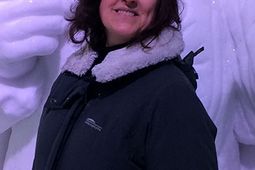Children from mixed backgrounds with one Muslim parent have plural identities
- UdeMNouvelles
05/19/2023
- Martin LaSalle
Quebec-born children with one Muslim immigrant parent forge identities that mix that parent’s cultural references and Quebec culture.
How do Quebec-born children in mixed families with one Muslim parent self-identify? How do they combine the different values transmitted by their parents and those of the society in which they grow up?
These are some of the questions that led Josiane Le Gall, an assistant professor of anthropology at Université de Montréal, to conduct a qualitative study with colleagues in religion, social work, anthropology and psychology at UdeM, Université Laval and Morocco's Al Akhawayn University.
The findings were published last August in a special issue of the journal Social Compass on how Muslim / non-Muslim families around the world navigate identity and religious issues in their daily lives and the social constraints they face.
Le Gall’s research grew out of a larger study on plural identity in about 100 people of mixed ethnicity in Quebec. She interviewed 23 people aged 18 to 40 with one Muslim immigrant parent. The Muslim parents came from Morocco, Tunisia, Lebanon, Côte d’Ivoire, Senegal, Guinea, Egypt, Gambia and Bangladesh. Two-thirds were non-practicing.
Quebecers first and foremost
Le Gall found three different patterns of cultural transmission in the subjects’ families: total absence of any cultural transmission, explicit transmission of identity markers (language and/or culture), and exposure to cultural references (the religion was not actively transmitted but cultural and religious practices were present in the home).
Participants were unanimous in saying they identified first and foremost as Quebecers and, to a lesser degree, as Canadian, regardless of whether the non-Muslim parent was born in Quebec or elsewhere.
“They were influenced above all by the place they were born; this is where they feel at home,” said Le Gall. “School and the friendships they formed shaped their identities more than anything else.”
At the same time, most of them were also attached to the cultural heritage transmitted to them by their immigrant parent.
“They claim a plural identity that combines cultural influences from the immigrant and non-immigrant parent,” explained Le Gall. “As the expression goes, they’re 100-per-cent mixed.”
Limited transmission of language and religion
Growing up in a multi-ethnic home has shaped these individuals in many ways. They have a connection to the cultural and culinary traditions of their Muslim parent’s native country, but in many cases little or nothing of the Muslim parent’s religion and language was passed down to them.
The majority of the subjects reported speaking French at home, and some spoke English.
“As adults, some regretted that their parent hadn’t taught them Arabic or other native language and made an effort to learn it,” Le Gall noted. “They would have liked to be able to speak it, especially when visiting relatives in their immigrant parent’s country of origin.”
Religion was an important dimension of identity for the handful of subjects whose parents were both practicing Muslims. The others said they had been exposed to some Islamic rituals but generally did not practice Islam or any other religion.
“Having been born in Quebec, they exhibited a certain reticence, if not indifference, about religion in general,” commented Le Gall.
Plural identity is enriching
It was in early adulthood that many of the subjects felt a stronger desire to claim their Muslim parent’s cultural markers. “As teens, they were more likely to reject or minimize the importance of their minority culture, “ said Le Gall.
In most cases, their identification with the minority culture was rooted mainly in their daily experiences and practices with their immigrant parent, rather than knowing the language and religion or having the nationality.
“While the identities constructed by the subjects varied widely, they all felt that their mixed cultural identity was enriching, not limiting,” said Le Gall. “They reject any rigid, predefined notion of identity and can easily reconcile the different facets of their identity, which they do not see as incompatible in any way."














